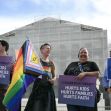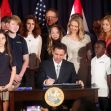Justices serving on the 11th Circuit Court of Appeals have ruled that laws passed in Palm Beach County and Boca Raton banning LGBT Conversion Therapy for juveniles is unconstitutional. The new ruling deems that therapists trying to “cure” a gay or transgender minor via conversion therapy are protected by First Amendment speech rights, and their practice cannot be banned by law.
Conversion Therapy, a treatment most often used by parents to forcefully change the sexual orientation of anyone identifying as LGBT or gender-neutral, has long been considered a draconian approach by medical professionals, including psychologists and the American Psychological Association (APA).
This new decision by the 11th Circuit Court is binding across the 11th Circuit’s jurisdiction, which covers Florida, Alabama and Georgia. This decision will now impact any other, similar laws in those three states, where bans on speech-based LBGT conversion will be deemed unconstitutional.
This ruling has now created a deep rift with the 9th and 3rd circuits, which had upheld gay conversion therapy bans. The prior bans on conversion therapy used, in part, psychological studies by numerous doctors warning juvenile LBGT conversion therapy is harmful and dangerous for youths who seek to change their gender identity or sexual orientation.
In a majority ruling, Trump-appointee US Circuit Judge Britt Grant overturned the ban, disparaging “professional societies” such as the American Academy of Pediatrics, an organization that strongly found gay conversion created in children “guilt and anxiety while having little or no potential for achieving changes.”
Grant, speaking for the court, said these professional groups may be acting in “good faith” but “their institutional positions cannot define the boundaries of constitutional rights.” A fellow Trump appointee serving on the 11th circuit court, Judge Barbara Lagoa, agreed with Grant.
However, US Circuit Judge Beverly Martin, the third justice in the case and an Obama appointee, strongly disagreed in her dissent.
“The APA Task Force Report catalogued recent studies reporting that patients who undergo experience negative consequences including ‘anger, anxiety, confusion, depression, grief, guilt, hopelessness, deteriorated relationships with family, loss of social support, loss of faith, poor self-image, social isolation, intimacy difficulties, intrusive imagery, suicidal ideation, self-hatred, and sexual dysfunction,” wrote Martin.
It is expected the Supreme Court may become involved in this new ruling, as it contradicts that of a similar case ruled on by the High Court out of California. That case, NIFLA v. Becerra, dealt with a similar law in California requiring any pregnancy counseling centers working with juveniles to notify parents of minors about state-run programs offering abortion or contraception. At the time, Justice Clarence Thomas noted in his majority opinion that the Supreme Court does not recognize “’professional speech’ as a category of speech subject to different rules.”






